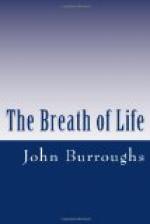This distrust of the physical forces, or our disbelief in their ability to give rise to life, is like a survival in us of the Calvinistic creed of our fathers. The world of inert matter is dead in trespasses and sin and must be born again before it can enter the kingdom of the organic. We must supplement the natural forces with the spiritual, or the supernatural, to get life. The common or carnal nature, like the natural man, must be converted, breathed upon by the non-natural or divine, before it can rise to the plane of life—the doctrine of Paul carried into the processes of nature.
The scientific mind sees in nature an infinitely complex mechanism directed to no special human ends, but working towards universal ends. It sees in the human body an infinite number of cell units building up tissues and organs,—muscles, nerves, bones, cartilage,—a living machine of infinite complexity; but what shapes and cooerdinates the parts, how the cells arose, how consciousness arose, how the mind is related to the body, how or why the body acts as a unit—on these questions science can throw no light. With all its mastery of the laws of heredity, of cytology, and of embryology, it cannot tell why a man is a man, and a dog is a dog. No cell-analysis will give the secret; no chemical conjuring with the elements will reveal why in the one case they build up a head of cabbage, and in the other a head of Plato.
It must be admitted that the scientific conception of the universe robs us of something—it is hard to say just what—that we do not willingly part with; yet who can divest himself of this conception? And the scientific conception of the nature of life, hard and unfamiliar as it may seem in its mere terms, is difficult to get away from. Life must arise through the play and transformations of matter and energy that are taking place all around us; though it seems a long and impossible road from mere chemistry to the body and soul of man. But if life, with all that has come out of it, did not come by way of matter and energy, by what way did it come? Must we have recourse to the so-called supernatural?—as Emerson’s line puts it,—
“When half-gods go, the gods arrive.”
When our traditional conception of matter as essentially vulgar and obstructive and the enemy of the spirit gives place to the new scientific conception of it as at bottom electrical and all-potent, we may find the poet’s great line come true, and that for a thing to be natural, is to be divine. For my own part, I do not see how we can get intelligence out of matter unless we postulate intelligence in matter. Any system of philosophy that sees in the organic world only a fortuitous concourse of chemical atoms, repels me, though the contradiction here implied is not easily cleared up. The theory of life as a chemical reaction and nothing more does not interest me, but I am attracted by that conception of life which, while binding it to the material order, sees in the organic more than the physics and chemistry of the inorganic—call it whatever name you will—vitalism, idealism, or dualism.




